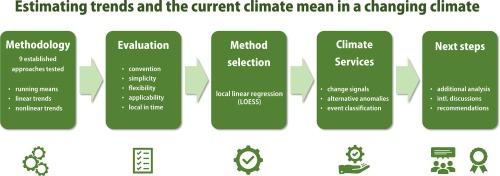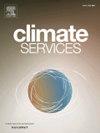Describing the climate evolution using trend lines and estimating the current climate mean (CCM) on the local scale is an important climate service. For an increasing number of variables, accelerating climate change disqualifies the use of traditional climatological normals and long-term linear trends as CCM estimators. Although several alternatives are available and already in use, there are few comprehensive assessments of the different approaches let alone a consensus for recommending a particular method. Here we evaluate frequently used approaches that use past climate data to estimate the CCM applying several transparent criteria. The performance is assessed in a perfect model framework for the strongly changing Swiss mean temperature 1864–2099 with the centered 30-year mean as CCM benchmark. Short-term linear trends, cubic splines and local linear regression with optimized parameters all provide unbiased CCM estimates for a broad range of climate evolutions and independent of trend magnitudes. To enable broad usability, additional criteria are considered such as a wide applicability to a large number of climate variables and simplicity in terms of use, settings and communication. In the overall assessment, local linear regression emerges as a particularly promising method to describe nonlinear climate trends and to determine the CCM. The criteria-based assessment approach has proven very useful in choosing a method as objectively as possible. We present ideas for modern climate services to complement the toolbox of climate monitoring and encourage the community to develop recommendations at the international level to increase the coherence, objectivity and robustness of climate monitoring products.



